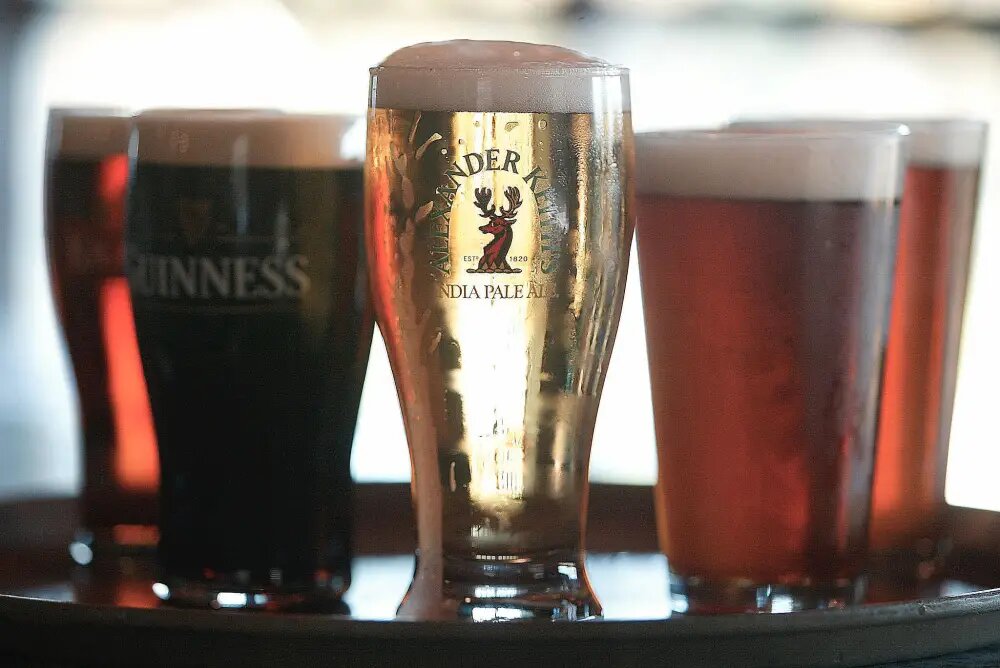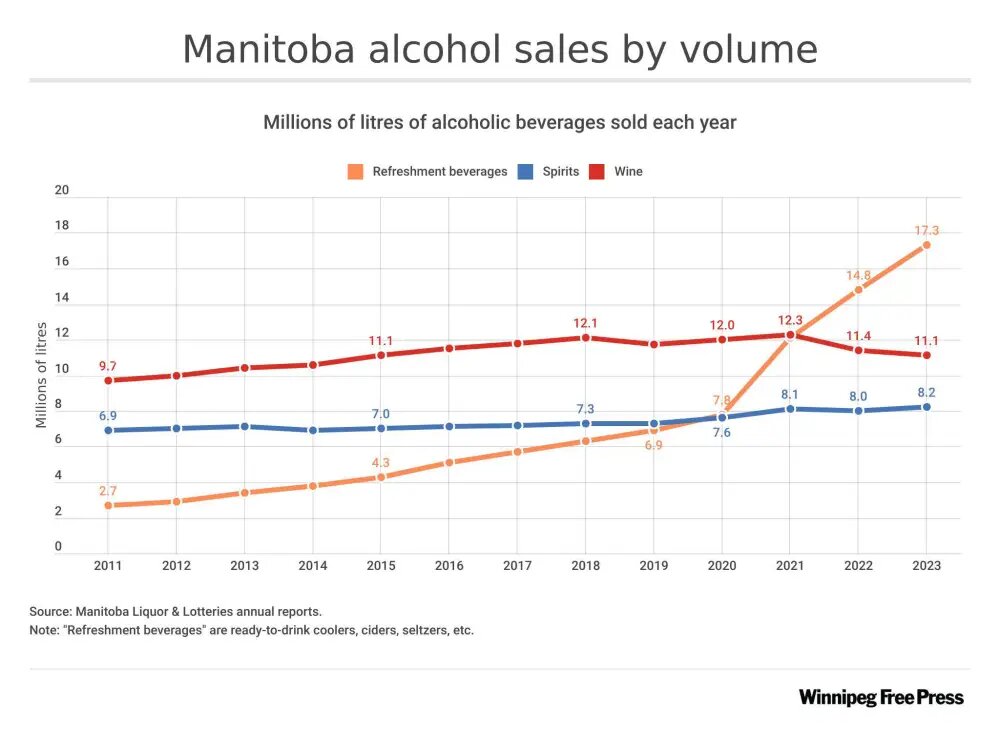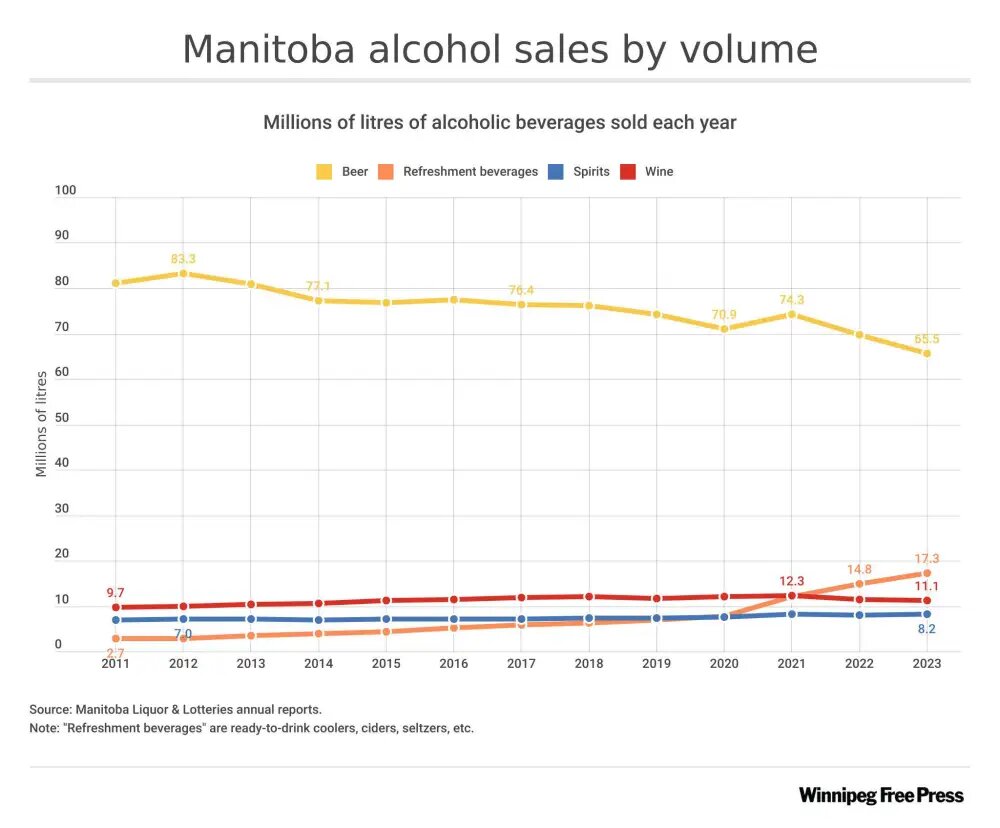Manitoba beer sales down as coolers, cannabis climbs
Advertisement
Read this article for free:
or
Already have an account? Log in here »
We need your support!
Local journalism needs your support!
As we navigate through unprecedented times, our journalists are working harder than ever to bring you the latest local updates to keep you safe and informed.
Now, more than ever, we need your support.
Starting at $15.99 plus taxes every four weeks you can access your Brandon Sun online and full access to all content as it appears on our website.
Subscribe Nowor call circulation directly at (204) 727-0527.
Your pledge helps to ensure we provide the news that matters most to your community!
To continue reading, please subscribe:
Add Brandon Sun access to your Free Press subscription for only an additional
$1 for the first 4 weeks*
*Your next subscription payment will increase by $1.00 and you will be charged $20.00 plus GST for four weeks. After four weeks, your payment will increase to $24.00 plus GST every four weeks.
Read unlimited articles for free today:
or
Already have an account? Log in here »
Hey there, time traveller!
This article was published 14/11/2023 (809 days ago), so information in it may no longer be current.
Winnipeg — Manitobans’ thirst for beer appears to be drying up.
Suds sales dropped by 6.4 per cent in the past fiscal year, continuing a decade-long downward trend in beer consumption, according to Manitoba Liquor & Lotteries Corp.
About eight million fewer pints were poured between April 1, 2022, and March 31, 2023, according to the Crown corporation’s annual report, marking a 12-year low for brews.

Despite the drop in sales, beer remained Manitobans’ favourite alcoholic beverage, with a whopping 65.5 million litres sold in the province.
“We are all hoping that the market share increases so that we can all survive. That’s the harsh reality,” Farmery Estate Brewery co-owner Chris Warwaruk said in an interview Monday.
“The real question is will the Manitoba consumer support all the breweries and the innovation that we’re trying to do?”
MLL partly attributes the decline in beer sales to increased consumer demand for what it calls “refreshment beverages.” The category includes coolers, hard seltzers and iced teas, premixed cocktails and ciders.
Sales of those products increased by 17 per cent in the past fiscal year, for a total of 17.3 million litres poured and $110.8 million in sales. Beer sales totalled $302 million in 2022-23, down about $20 million compared to the year prior.
Spirit and wine sales, meanwhile, have remained constant, with a small increase reported last year.
Warwaruk said local breweries are feeling the pinch of changing consumer habits and struggling to compete with massive marketing campaigns rolled out by international beverage corporations.
Meanwhile, supply chain issues and rising costs are further challenging the sector which has seen demand for beer decline nationally, he said.
“It’s true seltzers have taken up the gap,” Warwaruk said. “That put pressure on local breweries, because we can’t compete with big, domestic and international companies.”
“What are we supposed to do? It’s been very challenging.”

According to MLL, hotel beer vendor sales also decreased in the past year towards levels seen prior to the COVID-19 pandemic and as sales increased at bars, restaurants and other public venues.
Manitoba Hotel Association president Michael Juce said customers can expect to see seltzers and coolers to take more space on beer vendor shelves going forward. Demand for non-alcoholic options is also increasing, he added.
“Members will continue to adjust their product mix… and with the growth in refreshment beverages, continue to experiment with those.”
However, Juce said it’s unclear if the consumer shift toward coolers and seltzers is more than a short-term fad.
“Whenever there’s new products in market, you’ll see a pop and an increase in consumer interest,” Juce said. “These really exploded into the market, but it may be too early to tell.”
Local craft breweries will have to get creative to compete, Warwaruk said.
On top of its wide range of beers, Farmery sells a line of coolers and non-alcoholic products available for purchase in grocery stores, he explained. Other local brewers have also added hard seltzers to their product line.
“We all invested in a brewery because we have passion for what we do, we have passion for our craftsmanship and there’s no reason to expect the local industry not to continue to be innovative,” Warwaruk said, imploring customers to choose local.
Both the provincial government and MLL could assist local brewers in getting a foothold in other provinces, Warwaruk said, if local sales continue to decline.

“There’s only so much room to grow,” he said.
MLL posted a record profit in 2022-23, pulling in $740.9 million for the provincial government — up 23.9 per cent compared to the year prior.
The corporation’s casinos returned to full operation in 2022-23, and made $91.2 million for the province. Net revenue from VLTs was $193.5 million.
Cannabis sales made $31.2 million for the province, with customers buying more extracts, dried cannabis and edibles.
The net revenue from liquor operations was $319 million.
» Winnipeg Free Press
